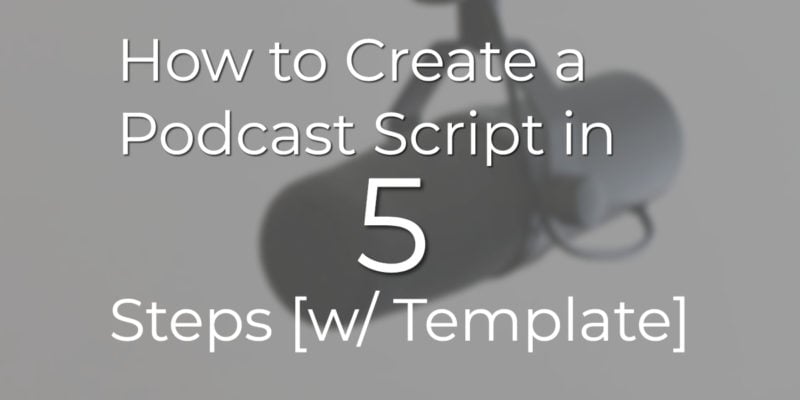Approaches to scripting vary among creators. Some script every word meticulously, ensuring precision and coherence. Others prefer the freedom of an outline, allowing natural flow. There are those who start with only a title, embracing improvisation. This diversity in approaches leads to the question: which method of scripting is most effective? The answer isn’t straightforward. Most successful podcasters find a middle ground, blending detailed planning with adaptability.
This article explores the essentials of a good podcast script. Whether you’re an experienced host or new to podcasting, you’ll learn how to choose the right podcast script template and sound natural. It covers creating scripts for different podcast formats, from solo shows to collaborative episodes. You’ll find tips on various script templates, ensuring your podcast name and episodes resonate with listeners. The guide also includes advice on integrating an effective call to action, keeping your audience engaged.
Why does my show need a script?
A script is a handy tool for podcasting. It is a fully-customizable skeleton of your episode and a styling tool that guides you in creating the overall feel of your show. Additionally, when you use a podcast script, it makes sure your show flows well, is free of unnecessary pauses, and is natural-sounding.
Besides, if you hate to ad-lib, a script will keep you focused by reminding you what to say next and how to say it.
Here we share a few different ways to write a podcast script. Try these methods, play with them, and tailor them to your satisfaction.

1. Write your script for speaking
Thankfully, it is fairly easy to write a script for speaking. Simply write as if you were talking out loud. That is, write it in your voice with the flow of how you naturally talk, plus use words you would genuinely use. It needs to be the authentic you. By doing this, your script will be natural-sounding as opposed to sounding robotic.
2. Keep it concise
You need a podcast script, but it does not have to be a super lengthy one. A brief outline gives you room for expansion and creativeness while podcasting. It also allows you to remain natural-sounding. You can keep it short by only incorporating words and sentences you need, which ensures that you are including the key points of importance. As well, it keeps you focused so you can get directly to the point.
3. Paint pictures with your words

This is as simple as helping your listeners picture what your podcast is all about. Give them visuals with your words. You can do this by including additional information for points of importance. It will help your audience to better understand what you are talking about. Try using stories that are easy to relate to. You don’t need to do this for every single point, but do make sure that you create enough visualization so that your audience can understand what you are trying to convey.
4. Give yourself flexibility
Your flexibility when podcasting is important. This involves including specific words, stories, topics, news, or anything you want to use in your script as a starting point to the conversation. The objective is to create space to explore the thoughts you have about the topics while podcasting. The more open and flexible you are the easier it will be to come up with an interesting podcast. In a nutshell, include only content in your script that will allow for maximum freedom to add-to and expand on the topics.
5. Make it your own
Every podcasters needs are different. Experienced podcasters may not need a detailed script or even a script at all. Newbies, on the other hand, may need something more comprehensive and meticulously planned out. However, they should be careful not to get caught up in reading the script as that can be quite boring for listeners.
Depending on your experience level and whether you are podcasting with guests or a co-host, prepare a script that is practical and easy to follow. For example, when podcasting with guests create a list of questions and key points in advance. This way your guests will be prepared and know what to expect. Alternatively, if you are podcasting with a co-host plan the episode beforehand. Write out who should discuss what topic, how to hand off topics, as well as the over plan of the episode to avoid confusion.
Podcast script template

In order to help you better understand how to create a podcast script below we have included a sample template. You can customize it as you wish to fit your needs. For example, in the case of an interview podcast swap out each topic with a question for your guest.
- Sponsor message
- Introduction
- Musical jingle/sound effects
- Longer explanation of what’s in store
- Topic 1
- Main point
- Supporting point
- Supporting data
- Supporting quote
- Segue
- Topic 2
- Main point
- Supporting point
- Supporting data
- Supporting quote
- Sponsor message
- Topic 3
- Main point
- Supporting point
- Supporting data
- Supporting quote
- Segue
- Outro
- Call to action
- Sponsor message
- Musical jingle/sound effects
Podcast Script Example
Here’s an example script for a podcast episode, formatted for a general discussion format:
Podcast Name: Tech Trends Today
Episode Title: Episode 10: The Future of Artificial Intelligence
Podcast Host: Sarah Mitchell
[Sponsor Message] “Today’s episode is brought to you by TechInnovate, empowering the next generation of technology pioneers.”
[Musical Jingle/Sound Effects]
Introduction:
Sarah Mitchell: “Hello and welcome to Tech Trends Today, I’m your host, Sarah Mitchell. In this episode, we’re diving into the fascinating world of Artificial Intelligence (AI) and its impact on our future.”
[Longer Explanation of What’s in Store]
Sarah Mitchell: “We’ll explore the latest advancements in AI, discuss its ethical implications, and predict how it will shape various industries. Joining us today are experts in the field to share their insights.”
[Segue to Topic 1]
Topic 1: AI Advancements and Innovations
Main Point: The current state of AI technology.
Sarah Mitchell: “AI has made leaps and bounds in recent years, from self-learning algorithms to advanced robotics.”
Supporting Point: Examples of AI breakthroughs.
Supporting Data: “Recent studies show AI’s remarkable progress in areas like healthcare, where it assists in diagnosis and treatment plans.”
Supporting Quote: “As Dr. Jane Smith, an AI researcher, says, ‘AI is not just a tool, it’s a revolution in making informed decisions.'”
[Segue to Topic 2]
Topic 2: Ethical Considerations of AI
Main Point: The importance of ethics in AI development.
Sarah Mitchell: “As AI becomes more integrated into our lives, ethical concerns, particularly regarding privacy and decision-making, come to the forefront.”
Supporting Point: Balancing innovation with ethical guidelines.
Supporting Data: “A survey by TechEthics shows 75% of tech professionals emphasize the need for ethical AI guidelines.”
Supporting Quote: “Tech guru John Doe commented, ‘With great power comes great responsibility, especially in AI.'”
[Sponsor Message] “Brought to you by TechInnovate, shaping a smarter tomorrow.”
[Segue to Topic 3]
Topic 3: AI’s Impact on Employment and Industry
Main Point: How AI is reshaping the job market.
Sarah Mitchell: “There’s growing discussion about AI’s role in the future of work, with automation transforming industries.”
Supporting Point: AI’s role in creating new job opportunities.
Supporting Data: “According to the AI Job Market Report 2023, AI has created over 2 million new jobs in the tech sector alone.”
Supporting Quote: “Industry leader Emily Rogers stated, ‘AI isn’t just replacing jobs; it’s creating them in fields we hadn’t imagined.'”
[Segue to Outro]
Outro:
Sarah Mitchell: “Thank you for joining us on this journey through the AI landscape. It’s clear that AI’s potential is as vast as our imagination.”
[Call to Action]
Sarah Mitchell: “If you found today’s discussion enlightening, please subscribe and share our podcast. Your support helps us bring more such insightful content.”
[Sponsor Message] “Tech Trends Today is brought to you by TechInnovate. Visit us at techinnovate.com for more information.”
[Musical Jingle/Sound Effects]
End of Script
This script follows the provided structure closely, incorporating sponsor messages, musical elements, and a clear segmentation of topics with supporting points and data. It is designed to be informative and engaging, ideal for a podcast focused on technology and innovation.
Types of podcast scripts and formats

Before choosing a podcast format, it is a good idea to understand and examine your personal communication style. That way, it is easier to create a podcast script that works for you. So, keep that in mind when reviewing the different types of podcast scripts. The good thing is that these script styles exist on a spectrum, which gives you the flexibility and freedom to customize them as needed.
The bullet point approach
This format is commonly used by show hosts, especially in shows that use freestyle banter with guests or a co-host, like often seen on radio shows. These scripts are easy to create and provide sufficient structure to get the episode up and running.
The bullet point format is ideal for shows that that have a co-host and/or regular guest appearances and interviews.
Podcasters using this format include:
Pros:
- A flexible show structure that makes it easy for editing
- Less preparation needed compared to other methods
- Provides some structure with plenty of opportunity for ad-libbing and improvisation
Cons:
- Less structure means increased probability of forgetting important points, getting side-tracked, rambling, etc.
The detailed episode outline

This format addresses the needs of most podcasters and is suitable for podcasters who want more structure for their episodes. It includes an intro, sponsored ad, music jingle, an outro with closing remarks, plus segues where necessary. Essentially, it has all the structural elements needed for a well-executed episode.
It is ideal for:
- Interview-style podcasts
- Shows with a co-host
Some of the podcasters using this method include:
Pros:
- Ensures that the host covers the main topics, as well as, sub-topics of interest
- Provides flow and structure to an episode, while still being casual
Cons:
- Takes more preparation and editing than freestyle approaches
The word-for-word script

While this format may not be suitable for all podcasters it does have it’s place. For the right audience and some niches (i.e. highly technical or medical) it has proven to be extremely valuable and in some cases essential. However, you need to be careful with this format as it can come across as robotic and stiff.
Ideal for:
- Shorter, education or advice-oriented shows
- Solo show podcasts
- Audio dramas
Here are some podcasters using this format:
Pros:
- Adds professionalism and structure
- Allows hosts to be self-confident as they have a pre-done script to follow
Cons:
- Can make the recording process complicated as this format does not leave room for flexibility
- It can take a lot of practice for hosts to learn the art of reading a script naturally
- Can lengthen the process of creating an episode
In conclusion
A podcast script is an essential tool that helps you create a professional show. Not to mention, taking your skills to another level whereby attracting more listeners. When used well, a script not only gives you the flexibility you need to communicate effectively, but as well ensures that you sound natural while hitting all the key points in each episode. It provides structure and guidance. Try the different format types and find the one that is right for you.
Happy podcasting!
